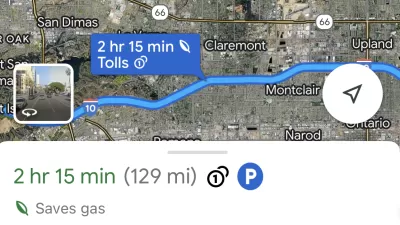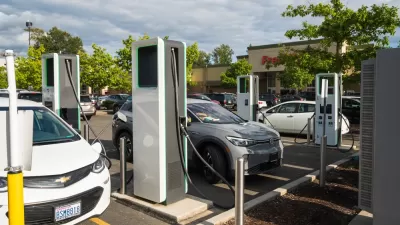What will it take to greatly reduce oil consumption and greenhouse gas emissions from passenger vehicles? Efficiency, alternative fuels, and strong governmental policies reports the National Research Council. And it will be highly unlikely.
The bar was set very high by Congress in 2010. They wanted to know what it would take to reduce oil and emissions by 80% by 2050. "Is it feasible?", they asked the National Research Council.
Short answer: While unlikely, with strong governmental intervention, "improving technologies driven by strong and effective policies could make deep reductions possible", according to the NRC's press release for the report, "Transitions to Alternative Vehicles and Fuels", released March 18. [Gateway NRC webpage provides for a variety of means to access 378-page report, including the table of contents to go directly to chapters].
Brian Bienkowski of The Daily Climate put in more directly:
Efforts to drastically slash automobile emissions and fuel use within 40 years don't stand a chance without subsidies, technology improvements and more stringent government standards, according to a report by a panel of experts released Monday.
Even hitting an intermediate target – cutting fuel use in half by 2030 – would be "very difficult," the council reported.
The report was written by a 19-member committee of academics and those in industry, staff and consultants (see page V).
A silver bullet - or silver buckshot?
There is no "silver bullet," said Douglas M. Chapin, an engineer and principal at a Virginia-based consulting company, MPR Associates, who chaired the committee. With technologies uncertain, the panel felt the best approach would be to promote a portfolio of vehicle and fuel research and development.
"Dr. Chapin is a member of the National Academy of Engineering and serves as chairman of the National Research Council’s Board on Energy and Environmental Systems", according to his webpage on MPR.
What we really need is silver buckshot: A suite of policy and technology options that will cut oil use, said Michelle Robinson, Union of Concerned Scientists, about the report. (She did not participate in preparing the report).
Land use policies and fuel taxes are analyzed in chapter 6: "Policies for Reducing GHG Emissions from and Petroleum Use by Light-Duty Vehicles."
The release of the report is timely as is coincides with the president's announcement of a $2 billion plan "to replace hydrocarbons as the primary fuel for the nation’s cars, trucks and buses."
FULL STORY: Major fuel, emissions savings unlikely in autos - report

Planetizen Federal Action Tracker
A weekly monitor of how Trump’s orders and actions are impacting planners and planning in America.

Restaurant Patios Were a Pandemic Win — Why Were They so Hard to Keep?
Social distancing requirements and changes in travel patterns prompted cities to pilot new uses for street and sidewalk space. Then it got complicated.

Map: Where Senate Republicans Want to Sell Your Public Lands
For public land advocates, the Senate Republicans’ proposal to sell millions of acres of public land in the West is “the biggest fight of their careers.”

Maui's Vacation Rental Debate Turns Ugly
Verbal attacks, misinformation campaigns and fistfights plague a high-stakes debate to convert thousands of vacation rentals into long-term housing.

San Francisco Suspends Traffic Calming Amidst Record Deaths
Citing “a challenging fiscal landscape,” the city will cease the program on the heels of 42 traffic deaths, including 24 pedestrians.

California Homeless Arrests, Citations Spike After Ruling
An investigation reveals that anti-homeless actions increased up to 500% after Grants Pass v. Johnson — even in cities claiming no policy change.
Urban Design for Planners 1: Software Tools
This six-course series explores essential urban design concepts using open source software and equips planners with the tools they need to participate fully in the urban design process.
Planning for Universal Design
Learn the tools for implementing Universal Design in planning regulations.
Heyer Gruel & Associates PA
JM Goldson LLC
Custer County Colorado
City of Camden Redevelopment Agency
City of Astoria
Transportation Research & Education Center (TREC) at Portland State University
Camden Redevelopment Agency
City of Claremont
Municipality of Princeton (NJ)





























